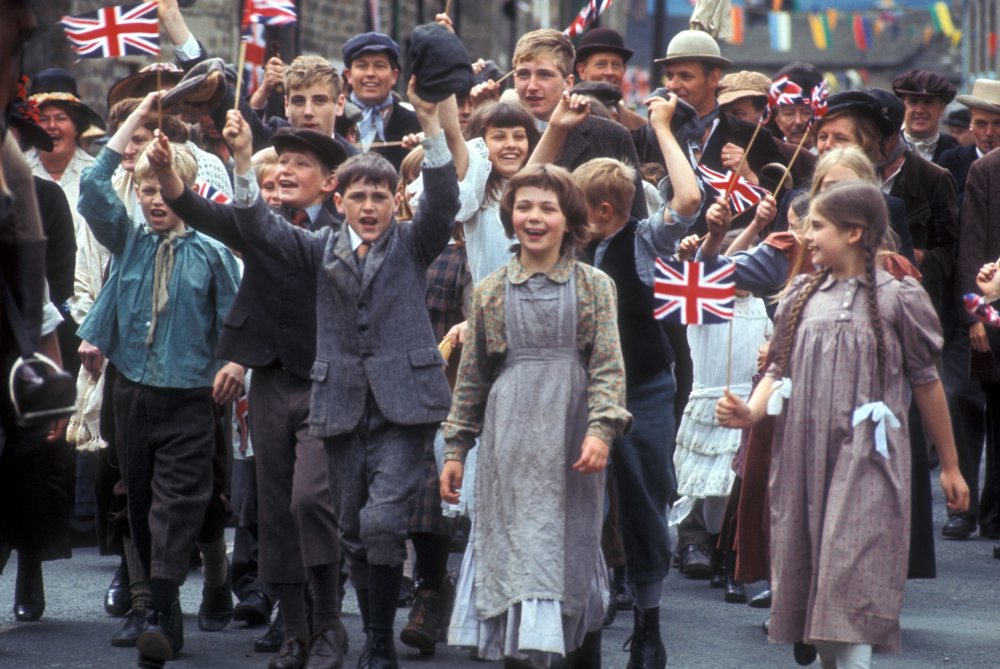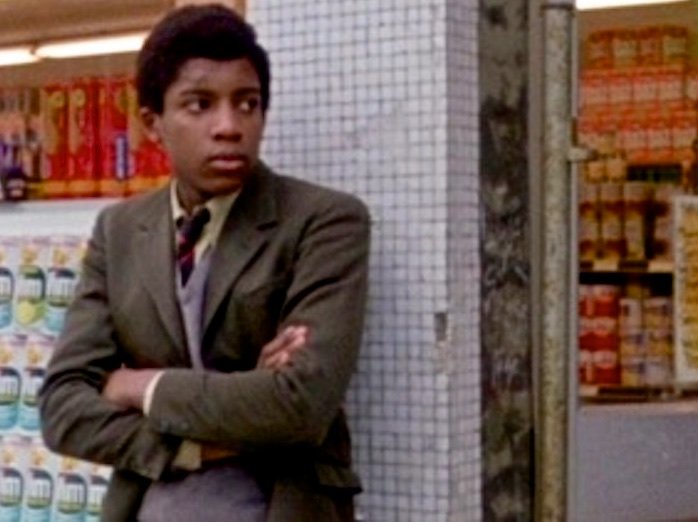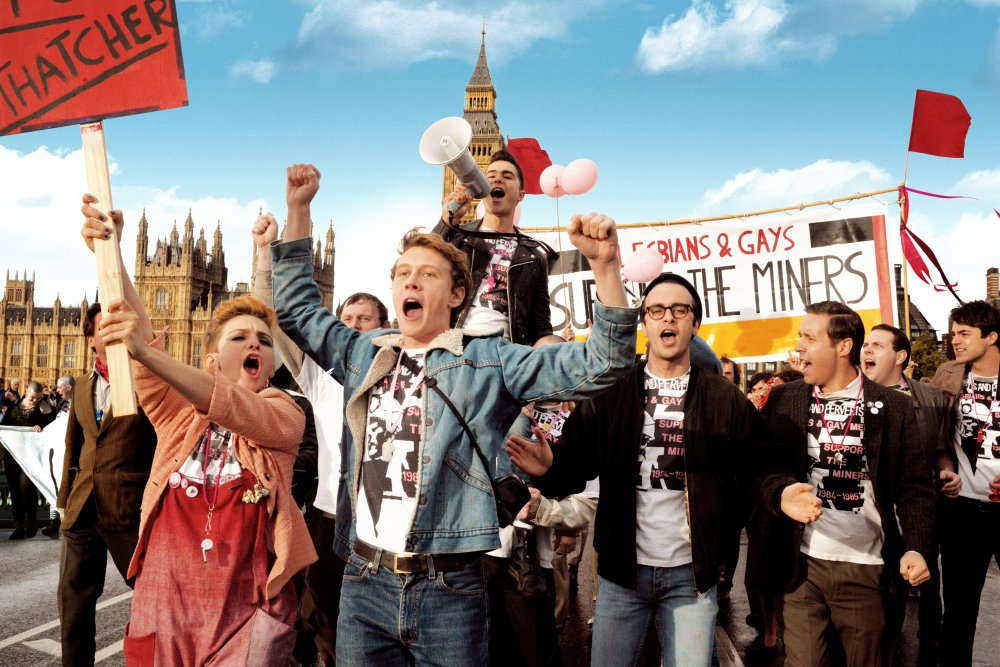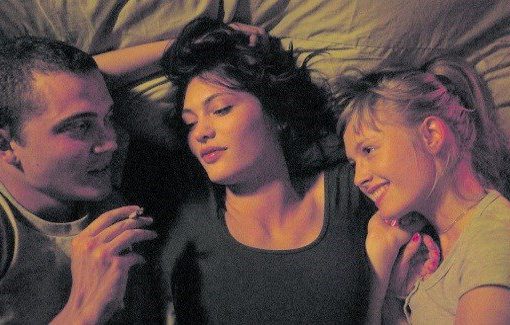Ahead of the UK premiere of Mike Leigh’s new film about the Peterloo massacre, writer Sam Thompson traces a path through other key films about English radicalism.
Peterloo (2018)
The premiere will be attended by Leigh and members of the cast
Peterloo, backed with National Lottery funding via the BFI Film Fund, is released in cinemas on 2 November
Mike Leigh’s characters are, often but not always, working class and rooted in the real world – affected by housing, jobs, public services, the law and policing. So, on one level, Peterloo – the 1819 massacre of suffrage demonstrators outside Manchester – seems like natural subject matter for his new film.
Yet Leigh also trades in the idiosyncrasies of feeling and the minutiae of relationships. How can you translate this level of human specificity into a story like Peterloo, which culminates in an assembly of 80,000 people? Can Leigh make his kind of movie about an event suited to Soviet-era pioneer Sergei Eisenstein?
Leigh is not the first filmmaker to wrestle with these problems. A variety of forms have attempted to show radical England with complexity and nuance: TV and film, documentary and drama, contemporary and historical, experimental and commercial.
The list below also contains films where the radical content reflects a break with traditional methods of film production. Film collectives have often recorded radical history. Taken together, the experimental films of the London Filmmakers Co-op are a portrait of radical counterculture movements since the 1960s: they made films about CND, AIDs activism and, above all, second-wave feminism. The Women and the Law Collective made three important films in 1986, chronicling the intersection between race and gender in contemporary Britain. The collectives nurtured by Channel 4 during its radical infancy often investigated English (and British) radical history.
England – rather than the UK – is the focus of this list because Peterloo seems to be a pivotal memory in the English – rather than British – imagination. It was an affront, in the words of E.P. Thompson, to the concept of the ‘free-born Englishman’, and became a watershed moment only in the policing of a domestic English population.
Winstanley (1975)
Directors Kevin Brownlow and Andrew Mollo

The English civil war (1642-51) has provided fertile soil for film – especially genre fare, from folk horror and swashbuckling romances to a lysergic psycho-thriller (A Field in England, 2013). But few have approached the period with the same historical seriousness as Winstanley.
Roughly, the civil war was fought between those who wanted parliament to be sovereign (Roundheads) and those who wanted to retain the monarch as an absolute ruler (Cavaliers). Adjacent to this conflict, capitalising on the dissenting zeitgeist, was the Digger movement, led by Gerrard Winstanley.
In gorgeous monochrome, Kevin Brownlow and Andrew Mollo’s film shows the Diggers appropriating vacant land in Surrey and living self-sufficiently until they are violently evicted by the local gentry. Despite an infamously difficult production, the film is a vital, edifying resource. Much of the narration is taken from Winstanley’s pamphlets, and there is power, warmth and hope in his call for a “common treasury”.
Days of Hope (1975)
Director Ken Loach

The working class is Ken Loach’s subject – like light for J.M.W. Turner or the family for Yasujiro Ozu. Sometimes his stories are fictions. Sometimes they are an enlarged, more militant reality.
In Days of Hope, Loach serves up a working-class history lesson. The four-part film, originally shown on the BBC, travels from the First World War to the General Strike of 1926, charting a huge range of early 20th-century radicalism. A conscientious objector in the first episode encapsulates the feeling of many of Loach’s characters: “I’m ready to fight, but in the only war that matters: the class war.”
Most of Loach’s pictures have an agitating purpose. His most recent, I, Daniel Blake (2016), is a protest against a crumbling welfare system shored up with sanctions and gatekeeping. Despite its historical setting, Days of Hope is no different: the mid-70s saw record numbers of strike days, and Loach’s film is a fable of ambition, unity and vigilance directed squarely at the workers.
Nightcleaners (1975)
Director Berwick Street Film Collective

Cleaners have often been at the forefront of the fight for better conditions at work – look at recent campaigns by cleaners at the Ministry of Justice and Kensington and Chelsea council. The protagonists in Nightcleaners are similarly inspiring: women, mostly of colour, organising for better pay in an industry abandoned by traditional trade unions.
The documentary is inventive and empathetic, and its critical insertion of the audience and filmmakers into the action has rightly made it an influential text in the history of political art and activist cinema.
Marc Karlin – founder of the Berwick Street Film Collective, and co-director of Nightcleaners – is a criminally underknown filmmaker. The 12 films he directed for Channel 4 between 1983 and 1999 represent a hymn – part eulogy, part manifesto – to radical England. A special mention for his dériving film essay For Memory (1986), which journeys from the vegetable patches of 1930s miners to stories of East End resistance to fascism and the execution of Levellers during the English civil war.
Pressure (1976)
Director Horace Ové

Pressure is often hailed as the first British feature by a black director, but it makes this list because of its serious treatment of the Black Power movement, most recently depicted in the Sky Atlantic series Guerrilla (2016) starring Idris Elba.
Tony has his O-levels but can’t get a job, and he faces condescension and antipathy everywhere in 1970s west London. After his friend is arrested, and he hears his brother brutalised by the police, Tony realises the Black Power movement is the only place where state violence is properly critiqued. A struggle to understand his identity as a Brit, Londoner and black man culminates with an explosive family feud: Tony tirades against his mother’s respectability politics, and she disowns him.
Pressure contains almost as much political speechifying, ideological debating and demo prepping as Peterloo. The final scene is a mournful picture as the activists demonstrate outside a police station in the pouring rain.
Carry Greenham Home (1983)
Director Beeban Kidron

This list is shamefully short on female directors. Carry Greenham Home carries the lamp for many female-helmed films tackling feminist praxis.
The documentary takes a forensic look at the Greenham Common women’s camp, based outside the US army base used to stored nuclear weapons. Between 1981 and 2000, camp dwellers engaged in a number of high profile actions, including creating a human chain around the complex and tying themselves to the base. Carry Greenham Home is notable for its privileged access to a militant organisation – Kidron spent seven months living in the camp – and for its clear-eyed look at the endemic problems of activism: in-fighting, an unsympathetic media, depleted finances and police brutality.
An earlier moment in the CND movement can be seen in Lindsay Anderson’s loving documentary, March to Aldermaston (1959). The action, which became an annual date in the left calendar, was a formative political experience for many anti-war radicals – including Mike Leigh.
Handsworth Songs (1986)
Director John Akomfrah

Stuart Hall was a theoretical touchstone for avant-garde documentarian John Akomfrah long before he was the subject of Akomfrah’s 2013 film, The Stuart Hall Project. The Hall approach is evident in Handsworth Songs, produced by the Black Audio Film Collective and first aired on Channel 4, which probes representations of the Handsworth riots and the life of Caribbean immigrants in the UK to find a common ideological undercurrent.
The film reflects the interdisciplinary collective: it’s a rich tapestry of archive and contemporary footage of the black experience, threaded through with eerie images, suggestive noises – a lonely drum, industrial whirring – and contemplative narration.
There have been other riot documentaries – Riots and Rumours of Riots (1981) projects back from the Brixton uprising of 1981 to find a story of British-Caribbean resistance; The Hard Stop (2015) looks at lives entwined in the 2011 unrest – but few match the formal daring or intelligence of Handsworth Songs.
It would make a perfect double bill with Isaac Julien’s Territories (1984), which makes similarly experimental use of sound and image to present Notting Hill Carnival as an act of radical resistance.
Comrades (1986)
Director Bill Douglas

Comrades is a true epic: a stirring, three-hour story of the Tolpuddle Martyrs, 19th-century trade unionists deported to Australia for their activism. It’s also a meditation on light, on the hillocks and fields of the south-west, and on mediation, iconography and early photography and film. Comrades is not alone on this list in connecting the power of collective action to the magical power of the moving image.
A lanternist, from whose eyes we see events unfold, happens upon Luddites breaking machines. We’re soon in the village of Tolpuddle: labourers work the land, enjoy fayres and dissent from their employer as he squeezes wages. As they organise, there are gothic tableaux of men swearing secret oaths to their union banner, which features a skeleton and declares ‘Remember Thine End’. The film takes some wicked digressions into absurdism after the workers are deported to Australia.
This was Bill Douglas’s only long-form feature and his last film before he died. Despite his meagre output, he remains a singular talent in British film history.
Made in Dagenham (2010)
Director Nigel Cole

Made in Dagenham is the first of two films in this list that are part of a peculiarly English, post-Full Monty (1997) cottage industry: films that commemorate working-class lives and resistance, while retreating from any of the more contentious politics, and presenting the story in an accessible, feel-good package, usually with a glittering cast of thespians.
Of course, it is a story worth telling. The strike, led by five sewing machinists at Dagenham’s Ford factory over the skill-level classification of their labour, was one of the first industrial disputes to invoke the idea of equal pay, and precipitated the Equal Pay Act 1970. Scenes where the indomitable Sally Hawkins defies her boss or her husband have an uncontainable, air-punching righteousness.
A West End musical adaptation starring Gemma Arterton followed in 2014.
Pride (2014)
Director Matthew Warchus

Pride is about the relationship between the activists in Lesbians and Gays Support the Miners (LGSM) and a Welsh pit town. As with Made in Dagenham, the central character is fictionalised in order to give us a familiar bildungsroman, every face is recognisable, and the political substance of the film has been, to some extent, defanged (Mark Ashton, founder of LGSM, was a communist). But again, Pride is undeniably energising, and there is now an international community that know and love this fable of solidarity.
Pride’s rhythm and tone is also ripe for the West End treatment. The strongest scene in the film is a musical number, albeit a slow and tender one, in which a miner’s wife starts singing ‘Bread and Roses’, and the assembly slowly joins in. Pride, again like Made in Dagenham, ends with concluding text, conspicuously absent from Peterloo, informing the audience that in 1985 Welsh miners led London Pride in an act of political reciprocity; Ashton died of an AIDs-related illness a year later.
Suffragette (2015)
Director Sarah Gavron

There were films about first-wave feminism before Suffragette – the BBC series Shoulder to Shoulder (1974) is a dense unpacking of the movement – but nothing near the dramatic ambitions of Sarah Gavron’s film, which shows the political strategising and actions in the lead up to that fateful Derby day.
Suffragette is easily the biggest grossing movie on this list, making £35m at the box office, but despite a big cast (including Meryl Streep) and coming in the centenary year of the events, the film failed to meet the expectations of the major awards. Perhaps this is because it lacks either the populist appeal of Pride or the aesthetic qualities of Comrades. Although Suffragette never quite recaptures the startling immediacy of its opening moments, by centring the struggles of a working-class suffragette it maintains a real urgency.
Suffragette not only depicted radical England; the film ignited it. At the premiere, domestic violence campaigners from Sisters Uncut staged an occupation of the red carpet.






